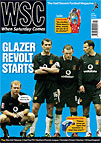 England may have won in Chicago last month, but in cinemas the United States are busy winning the 1950 World Cup game. Rich Zahradnik is not impressed
England may have won in Chicago last month, but in cinemas the United States are busy winning the 1950 World Cup game. Rich Zahradnik is not impressed
Someone once wrote that the only great sports films are those where the audience doesn’t know the end result. If you lived the excitement of the real event, says the theory, no film could possibly engender the same emotions. This explains why Chariots of Fire worked so well, at least here in the United States where no one had any idea how those British athletes did in the 1924 Olympics. For this reason, I always thought the United States’ 1-0 victory over England in the 1950 World Cup would make a good film. No one in America cared about the victory when it happened and very few know of it today. Football memories here stretch back no further than the World Cup of 1994.
The US may have won the match, but The Game of Their Lives is a loser. The film doesn’t pick one or two characters to build the story around and thus create interest; it’s heavy-handed in setting up the English as villains and lead-footed in playing the patriot card. Midway through, the hastily assembled US team – a group of Italian-Americans from St Louis and a Scot, a German and a couple of Portuguese (all hyphen Americans) from the East Coast, and Joseph Gaetjens of Haiti – are well beaten by a team of touring English stars lead by Stan Mortensen of Blackpool.
They then all gather for the requisite jacket-and-tie dinner and Mortensen, played by rockstar Gavin Rossdale of Bush, rises to speak: “Best of luck. And after England takes you to soccer school have a good holiday or, as you say it, vacation, in Brazil.” The pride, the hubris, oh the fall to come! US coach William Jeffrey is just as condescending to his charges and is presented as being in awe of the English players, odd for a man with a Scottish accent.
The film hits bottom at a US Air Force base in Brazil, where a general, with planes and airmen arrayed behind him, announces that President Truman has just ordered troops to Korea. “Never is wearing the red, white and blue more important than when our nation is at war,” says the general. He then presents each player with his uniform announcing each man’s military rank and medals won in the Second World War. Right, now off to war against our old allies England standing in for the dirty communists in a game no one at home really cares about. (Korea brings up an unfortunate coincidence. Last year another film, also called The Game of Their Lives told the story of that other “greatest upset in World Cup history”: North Korea over Italy in 1966. A documentary, it features interviews with surviving North Korean players.)
Football films fall apart in many ways and in many places – players who can’t act, actors who can’t play, situations that are cliches of cliches. Here, the big game is filmed well enough on the surface. The action looks real and suitably old-fashioned, a dark heavy ball thudding off massive boots. The English hit the posts and crossbar five, six times; Frank Borghi, the goalkeeping undertaker from St Louis, did play the game of his life, by all accounts. But by those same accounts, Gaetjens’ goal was the lightest of glancing headers. In the film, Gaetjens rises and slams the ball back across the goal into the corner, a Hollywood goal.
And here’s the challenge: with the goal scored in the 37th minute, how do you make exciting a ferocious defensive stand lasting 53 minutes? I don’t have a good answer. Neither did director David Anspaugh. In the end, Borghi catches the ball a whole lot. Geoffrey Douglas’s book of the same title, on which the movie is based, is better for its details, though it, too, never creates a real sense of excitement.
The film opened on April 22 in the US with very little promotion. It’s no fair trade for Bend it Like Beckham.
From WSC 221 July 2005. What was happening this month